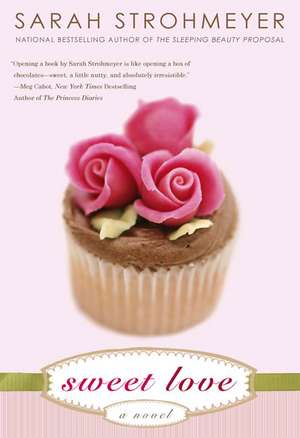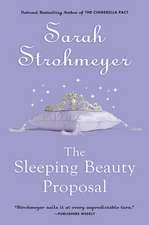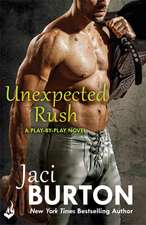Sweet Love
Autor Sarah Strohmeyeren Limba Engleză Paperback – 31 mai 2009 – vârsta de la 18 ani
A delicious novel about the power of love-and dessert-by the national bestselling author.
Betty Mueller believed she did right by secretly ending her daughter Julie's relationship with Michael Slayton, a wild, older neighborhood heartthrob. Twenty years later, Betty has come to realize her mistake. Workaholic Julie is now the single mom of a teenager-and Michael, the one man who could make her happy, has been out of her life for the past two decades.
Determined to make amends, Betty schemes to reunite the couple in a dessert class. And with the love of her mother and daughter, her own determination, and lots of chocolate, Julie's chance for romance is all the higher...
Betty Mueller believed she did right by secretly ending her daughter Julie's relationship with Michael Slayton, a wild, older neighborhood heartthrob. Twenty years later, Betty has come to realize her mistake. Workaholic Julie is now the single mom of a teenager-and Michael, the one man who could make her happy, has been out of her life for the past two decades.
Determined to make amends, Betty schemes to reunite the couple in a dessert class. And with the love of her mother and daughter, her own determination, and lots of chocolate, Julie's chance for romance is all the higher...
Preț: 124.72 lei
Nou
Puncte Express: 187
Preț estimativ în valută:
23.87€ • 26.00$ • 20.11£
23.87€ • 26.00$ • 20.11£
Carte disponibilă
Livrare economică 02-16 aprilie
Preluare comenzi: 021 569.72.76
Specificații
ISBN-13: 9780451226907
ISBN-10: 0451226909
Pagini: 349
Dimensiuni: 134 x 204 x 20 mm
Greutate: 0.3 kg
Editura: New American Library
ISBN-10: 0451226909
Pagini: 349
Dimensiuni: 134 x 204 x 20 mm
Greutate: 0.3 kg
Editura: New American Library
Recenzii
"A memorable menu of believable relationship courses, seasoned with angst and humor."
-Publishers Weekly
"[A] tender look at lost loves and whether they were ever really lost."
-Columbus Dispatch
"Signals that the romance and food are inextricably connected."
-New York Times
"What's not to like?"
-People
-Publishers Weekly
"[A] tender look at lost loves and whether they were ever really lost."
-Columbus Dispatch
"Signals that the romance and food are inextricably connected."
-New York Times
"What's not to like?"
-People
Notă biografică
Sarah Strohmeyer is the bestselling author of Sweet Love, The Cinderella Pact, The Sleeping Beauty Proposal, The Secret Lives of Fortunate Wives, and the popular "Bubbles" series. She lives with her family outside Montpelier, Vermont.
Extras
Chapter One of Sweet Love by Sarah Strohmeyer
…we know what we are, but know not what we may be.
— HAMLET, ACT IV, SCENE 5
Ahh, the magic of an authentic chocolate chip cannolo made fresh in Boston's Italian North End. Creamy sweet white ricotta center, crisply fried outside shell—not too thick, not too thin, never stale—the seductive, nay decadent, contribution of chocolate chips and a light dusting of powdered sugar to sweeten the lips.
This is what brings three generations of my family together for Mother's Day. Cannoli.
At Mike's Pastry, my mother, my teenage daughter, and I gather around our tiny round white table and dig in like pigs, inhaling the aroma of fresh cappuccino around us and savoring each crunch, every sweet, creamy mouthful. We are oblivious to the crowds of Sunday churchgoers who have forgotten their solemn prayers not to be led into temptation as they push their way to the front of the line and curse the cutters. Everyone's shouting like dockworkers in this crazy place, but not us.
We are silent in appreciation.
My father says the only way to muzzle a Mueller woman is to feed her. Very funny. Like he has room to talk. He's a man and what bonding experiences do men have? Football and hunting. Watching intellectually challenged mutants head butt each other back and forth down a field or pumping defenseless woodland creatures with shot. Really, it's sad. No wonder when it comes to making friends, men are as clueless as cavemen with cell phones.
"The floor is moving," says Era, my daughter, as she pushes away what's left of her cannolo and closes her eyes. "I might be drunk."
Like her grandmother and me, she has a promising sweet tooth, but without our experience lacks the crucial endurance. Which might be a good thing since too much sugar can steal a young woman's beauty. Already, her figure is rounding and softening—though that doesn't seem to put off the group of handsome dark Italian boys who've been eyeing her and her long blond hair.
"Fight you for it." Heartless, my mother points to what's left on Em's plate. "Can't just let it go to waste."
I sip my foamy cappuccino and tell Mom it's hers. "Happy Mother's Day."
"Aw, gee. You shouldn't have," she says, downing the morsel in one bite.."And now," she adds, opening her purse, "I have your present."
"My present?" I'm taken aback. "That's a switch. How thoughtful."
"Don't get too excited," Em says. "You're gonna hate it. Worst Mother's Day present ever."
"Watch it, kiddo. You're turning into a wise guy like your mother."
Mom hands me a large white envelope. "Surprise."
A gift card to Neiman's, I hope. Or maybe a massage. Perhaps a whole spa visit. I'm dying for one of those. The stress at work has been killing me and those bags under my eyes! Doty, the makeup guru at WBOS, where I'm a TV reporter, has pulled every trick to get rid of them—tea bags, cucumbers, Preparation H—and only the Preparation H works (if you ignore the reek of cod liver oil and the trail of cats behind me).
But when I open the card, my heart falls to my full stomach. "Cooking classes?"
"Dessert," Mom corrects. "And don't be so ungrateful. It's rude."
Em mouths, "I told you so."
This, I suspect, is another one of my mother's sinister efforts to reel me into her world of hard-core domestication. Over the years she's given me oven mitts and aprons, a mini chopper, flexible cutting board (declared by Mom to be an "absolute godsend!"), a cherry pitter and a garlic press (neither of which I've ever used), and cookbooks galore, most with the word "Dummies" in the title.
Recently, she turned her attention to laundry, singing the praises of oxidizing bleach ("How did I ever live without it?") and iron-free shirts (polyester-coated cotton—why not just buy straight polyester for a quarter of the price?), though she never fully abandoned her core campaign to get me into the kitchen, as proven by this latest salvo:
You have received the exciting gift of
THREE (3) DESSERT TECHNIQUE classes taught by
CHEF RENE D'OURS at The Famous Boston Cooking School.
It's not that I don't want to learn how to cook, it's that I'm, well, afraid. Cooking reminds me too much of Mom's imprisonment in her Harvest Gold kitchen, chained to the stove in a dowdy pink quilted, zippered housecoat dicing, rolling, pounding, and mixing her dreams into an impossibility.
Dinner was Mom's raison d'etre, her daily work product served promptly at six without fail. Though she rarely expanded beyond twenty rotated dishes, there was always a meat, starch, vegetable, and salad, with white bread in a plastic basket on the table next to a plate of rock-hard butter.
Two menus, however, were sacrosanct: Monday (meat loaf/mashed potatoes/green beans) because she needed meat loaf sandwiches for school lunches, and Friday (fish/spinach/fried potatoes) because the Pope said so.
In between, it was a crapshoot — liver and onions once a month, ham to be recycled endlessly in hash, a Sunday roasted chicken that would mysteriously reappear as tetrazzini on Tuesday and then ground and mushed in those questionable croquets on Thursday. Spareribs with baked beans, brown bread, and applesauce on Saturday night. Spaghetti with ground beef, garlic bread, and salad on Wednesday.
I know Mom grew weary of making dinner, but she never tired of making dessert, the gooier the better. Even when European cheeseboards invaded America around the late '70s and doctors urged my father to increase his intake of fresh foods, my mother stood firm. If fruit had to be involved, then it would be baked to death in a cinnamon apple crisp and topped with artery-clogging whipped cream straight from the can as nature intended.
The truth was, 99 percent of her best desserts came off the backs of boxes — Hershey's fudge cake, banana pudding with NILLA wafers, ice box cake made from Nabisco chocolate cookies — though on Saturday nights she'd make homemade dark chocolate sauce. I LOVE that fudge sauce, especially over peppermint ice cream.
But actually make it myself? No way. I don't care if it's as easy as my mother says. Once I start whipping up fudge sauce, I'll be on to brownies and cookies, slowly easing into the hard stuff like cakes, which require whole days to bake, cool, and frost. After that, can roasting a turkey and making tetrazzini with leftovers be far behind?
I shudder to think.
"Thank you sooo much," I coo, pecking her on the cheek and giving her a quick hug. "This is really, really nice."
"So&you'll go?" Mom asks doubtfully, her fading blue eyes questioning.
"Of course, I'll go. I'm looking forward to it. I'm actually very, very, very excited."
She sits back, satisfied. "Good. Because my guess is you'll be delighted by how much you'll like it. I've got a packet of information at home for you to read and even one of Chef Rene's cookbooks I bought on sale. Who knows, this might open a whole new world for you, Julie."
"Who knows?" I say, throwing up my hands in wonderment.
"Ha, ha," Em singsongs as we leave Mike's and head into a soaking May drizzle. "You have to go to school."
Yeah? That's what she thinks.
After Em cooks dinner (raspberry chicken avec Chambord/wild rice/asparagus), she retreats to her room to do homework. Dad falls asleep as usual in the wing chair with the TV on low, and Mom and I? Well, what I had in mind was a relaxing evening on the couch with a book and maybe a teeny tiny slice of the baba rum cake we bought at Mike's. It is, after all, Mother's Day. The dishes can wait.
But not Mom.
Soon she's puttering around my kitchen, wrapping up food and quietly stacking plates. It's the quiet part that drives me nuts because it's so damn false. She wants me to hear so I'll feel guilty even though it's my house and as far as I'm concerned the dishes can sit until next year. Why can't she leave them be?
I try to read my book, but it's no good. I'm dealing with a pro here. She hums tunelessly. She drops cutlery. She goes "Ow!" if the water's too hot. And finally, when she groans as she bends down to put away a serving plate, I declare defeat.
"You should start with the glasses first." Victorious in her efforts, she happily dunks the Orrefors delicately in the flesh soapy water. "That way there's no greasy residue."
Thank you, Heloise, I think, waiting with a dish towel to dry and wondering when she's going to stop wearing those gawdawful T-shirts with the silk-screen prints: herbs, wildflowers, cardinals at the bird feeder.
Em and I have bought her other shirts, normal shirts worn by normal people, that she professes to adore. But the next day there she is going out to get the mail with a big grizzly bear stamped across her bosom and the word Alaska written in loopy cursive around her waist.
"This is the last dish in Aunt Charlotte's pattern," Mom says, handing me a rather hideous gold and green bowl. "All the rest she threw at Uncle Herbert."
I know this, of course, because Mom tells the exact same single time she sees that bowl. I can recite in my sleep how Aunt Charlotte trashed her entire set of wedding china when Uncle Herbert came home to announce that he'd blown all their savings in electric energy. And how Charlotte eventually admitted she'd been itching for an excuse to get rid of that pattern all along since Herbert's mother chose it and Charlotte, then a young bride-to-be, had reluctantly agreed simply to appease her future mother-in-law, who turned out to be a right witch who intentionally chose an ugly pattern.
Often my mother recounts these vignettes of family history when she's doing chores, yapping about Aunt Charlotte's plates or Uncle Herbert's basset hound, Pokey, who spent his days in Herbert's Laundromat where the steam zapped Pokey of his zing. Sometimes she incorporates cleaning tips, like how Nana used to spray the plastic shower curtain liners to keep them from molding (whereas my solution is to throw them out). Or how after the market crash of 1929, Great-Aunt Louise kept her family of five fed for two weeks on one ham thanks to an old-fashioned hand-crank meat grinder.
"You learned how to make the most of every last scrap during the Depression," Mom inevitably adds when retelling the Great-Aunt Louise Great Depression ham story. "Then again, I make the most of every last scrap too. I'm not from your disposable generation."
Tonight, though, aside from the Aunt Charlotte comment, my mother grows taciturn, a word I learned when I studied for my SATs and I don't think I've used once since. She is pensive, moving methodically from good glasses to everyday glasses to good plates to not-so-good plates, to cutlery, her gray brows furrowing as she wipes and rinses.
I decide her sullenness is the fault of my brother, Paul, a playboy stockbroker in New York City who has forgotten to call on Mother's Day. An unforgivable sin in her book and one not easily atoned for with belated flowers or chocolate.
"It's not Paul," Mom says when I gleefully accuse him. "Anyway, he did send me a card and a pass to the Renew Day Spa in Waverly."
Damn. That's what I wanted.
"No, if there's any reason I'm off," she says with a pout, "it's because of you."
I dump the forks in the dishwasher, falsely accused again. "Me? What have I done now?"
"It's not what you've done. It's what you're going to do. Or, rather, not going to do. You're not going to go to those dessert classes I got. I just know it."
I find myself turning red as I attempt to sputter a lie. "That's not¬ true. Of course, I'm…"
"Don't lie, Julie. I don't care if you skip the classes as much as I care that you tell the truth."
"Look, Mom. It's not that I don't appreciate the classes or your intention behind giving them. I do. It's just that…" What reason can I invent so I don't hurt her feelings? "I have to work on Friday nights and it might be hard for me to get away."
"Bull." Mom hands me the washed rice pot, suds still clinging to the handle. "You can change your schedule, it's far enough away, and you haven't even looked at your packet or cookbook. You've shown absolutely no interest in this gift whatsoever. I hate to sound crass, but those dessert classes weren't cheap, you know. Quite a bit of scratch for an old lady on a fixed income."
This is a new personal record for her. Gift guilt + daughter inconsideration + expense + the old lady + the "fixed income" line. One can't help but be impressed.
"Sorry, Mom. You're right. I'll go to the classes and enjoy them. In fact, I'll read over the packet tonight just to make you happy."
Mom goes, "Hmph." Though I can tell she's pleased.
But it's not until long after she's in bed and I'm flipping through the packet that I smell a skunk. My dear sweet mother's not eager to see me improve my culinary skills one bit.
For as I scan a list of fellow future classmates, I come to the bottom and stop short at the name in bold block letters.
MICHAEL SLAYTON.
The man I once loved to the depths of my soul.
The man whose career I once ruined.
Surely, this can be no coincidence.
…we know what we are, but know not what we may be.
— HAMLET, ACT IV, SCENE 5
Ahh, the magic of an authentic chocolate chip cannolo made fresh in Boston's Italian North End. Creamy sweet white ricotta center, crisply fried outside shell—not too thick, not too thin, never stale—the seductive, nay decadent, contribution of chocolate chips and a light dusting of powdered sugar to sweeten the lips.
This is what brings three generations of my family together for Mother's Day. Cannoli.
At Mike's Pastry, my mother, my teenage daughter, and I gather around our tiny round white table and dig in like pigs, inhaling the aroma of fresh cappuccino around us and savoring each crunch, every sweet, creamy mouthful. We are oblivious to the crowds of Sunday churchgoers who have forgotten their solemn prayers not to be led into temptation as they push their way to the front of the line and curse the cutters. Everyone's shouting like dockworkers in this crazy place, but not us.
We are silent in appreciation.
My father says the only way to muzzle a Mueller woman is to feed her. Very funny. Like he has room to talk. He's a man and what bonding experiences do men have? Football and hunting. Watching intellectually challenged mutants head butt each other back and forth down a field or pumping defenseless woodland creatures with shot. Really, it's sad. No wonder when it comes to making friends, men are as clueless as cavemen with cell phones.
"The floor is moving," says Era, my daughter, as she pushes away what's left of her cannolo and closes her eyes. "I might be drunk."
Like her grandmother and me, she has a promising sweet tooth, but without our experience lacks the crucial endurance. Which might be a good thing since too much sugar can steal a young woman's beauty. Already, her figure is rounding and softening—though that doesn't seem to put off the group of handsome dark Italian boys who've been eyeing her and her long blond hair.
"Fight you for it." Heartless, my mother points to what's left on Em's plate. "Can't just let it go to waste."
I sip my foamy cappuccino and tell Mom it's hers. "Happy Mother's Day."
"Aw, gee. You shouldn't have," she says, downing the morsel in one bite.."And now," she adds, opening her purse, "I have your present."
"My present?" I'm taken aback. "That's a switch. How thoughtful."
"Don't get too excited," Em says. "You're gonna hate it. Worst Mother's Day present ever."
"Watch it, kiddo. You're turning into a wise guy like your mother."
Mom hands me a large white envelope. "Surprise."
A gift card to Neiman's, I hope. Or maybe a massage. Perhaps a whole spa visit. I'm dying for one of those. The stress at work has been killing me and those bags under my eyes! Doty, the makeup guru at WBOS, where I'm a TV reporter, has pulled every trick to get rid of them—tea bags, cucumbers, Preparation H—and only the Preparation H works (if you ignore the reek of cod liver oil and the trail of cats behind me).
But when I open the card, my heart falls to my full stomach. "Cooking classes?"
"Dessert," Mom corrects. "And don't be so ungrateful. It's rude."
Em mouths, "I told you so."
This, I suspect, is another one of my mother's sinister efforts to reel me into her world of hard-core domestication. Over the years she's given me oven mitts and aprons, a mini chopper, flexible cutting board (declared by Mom to be an "absolute godsend!"), a cherry pitter and a garlic press (neither of which I've ever used), and cookbooks galore, most with the word "Dummies" in the title.
Recently, she turned her attention to laundry, singing the praises of oxidizing bleach ("How did I ever live without it?") and iron-free shirts (polyester-coated cotton—why not just buy straight polyester for a quarter of the price?), though she never fully abandoned her core campaign to get me into the kitchen, as proven by this latest salvo:
You have received the exciting gift of
THREE (3) DESSERT TECHNIQUE classes taught by
CHEF RENE D'OURS at The Famous Boston Cooking School.
It's not that I don't want to learn how to cook, it's that I'm, well, afraid. Cooking reminds me too much of Mom's imprisonment in her Harvest Gold kitchen, chained to the stove in a dowdy pink quilted, zippered housecoat dicing, rolling, pounding, and mixing her dreams into an impossibility.
Dinner was Mom's raison d'etre, her daily work product served promptly at six without fail. Though she rarely expanded beyond twenty rotated dishes, there was always a meat, starch, vegetable, and salad, with white bread in a plastic basket on the table next to a plate of rock-hard butter.
Two menus, however, were sacrosanct: Monday (meat loaf/mashed potatoes/green beans) because she needed meat loaf sandwiches for school lunches, and Friday (fish/spinach/fried potatoes) because the Pope said so.
In between, it was a crapshoot — liver and onions once a month, ham to be recycled endlessly in hash, a Sunday roasted chicken that would mysteriously reappear as tetrazzini on Tuesday and then ground and mushed in those questionable croquets on Thursday. Spareribs with baked beans, brown bread, and applesauce on Saturday night. Spaghetti with ground beef, garlic bread, and salad on Wednesday.
I know Mom grew weary of making dinner, but she never tired of making dessert, the gooier the better. Even when European cheeseboards invaded America around the late '70s and doctors urged my father to increase his intake of fresh foods, my mother stood firm. If fruit had to be involved, then it would be baked to death in a cinnamon apple crisp and topped with artery-clogging whipped cream straight from the can as nature intended.
The truth was, 99 percent of her best desserts came off the backs of boxes — Hershey's fudge cake, banana pudding with NILLA wafers, ice box cake made from Nabisco chocolate cookies — though on Saturday nights she'd make homemade dark chocolate sauce. I LOVE that fudge sauce, especially over peppermint ice cream.
But actually make it myself? No way. I don't care if it's as easy as my mother says. Once I start whipping up fudge sauce, I'll be on to brownies and cookies, slowly easing into the hard stuff like cakes, which require whole days to bake, cool, and frost. After that, can roasting a turkey and making tetrazzini with leftovers be far behind?
I shudder to think.
"Thank you sooo much," I coo, pecking her on the cheek and giving her a quick hug. "This is really, really nice."
"So&you'll go?" Mom asks doubtfully, her fading blue eyes questioning.
"Of course, I'll go. I'm looking forward to it. I'm actually very, very, very excited."
She sits back, satisfied. "Good. Because my guess is you'll be delighted by how much you'll like it. I've got a packet of information at home for you to read and even one of Chef Rene's cookbooks I bought on sale. Who knows, this might open a whole new world for you, Julie."
"Who knows?" I say, throwing up my hands in wonderment.
"Ha, ha," Em singsongs as we leave Mike's and head into a soaking May drizzle. "You have to go to school."
Yeah? That's what she thinks.
After Em cooks dinner (raspberry chicken avec Chambord/wild rice/asparagus), she retreats to her room to do homework. Dad falls asleep as usual in the wing chair with the TV on low, and Mom and I? Well, what I had in mind was a relaxing evening on the couch with a book and maybe a teeny tiny slice of the baba rum cake we bought at Mike's. It is, after all, Mother's Day. The dishes can wait.
But not Mom.
Soon she's puttering around my kitchen, wrapping up food and quietly stacking plates. It's the quiet part that drives me nuts because it's so damn false. She wants me to hear so I'll feel guilty even though it's my house and as far as I'm concerned the dishes can sit until next year. Why can't she leave them be?
I try to read my book, but it's no good. I'm dealing with a pro here. She hums tunelessly. She drops cutlery. She goes "Ow!" if the water's too hot. And finally, when she groans as she bends down to put away a serving plate, I declare defeat.
"You should start with the glasses first." Victorious in her efforts, she happily dunks the Orrefors delicately in the flesh soapy water. "That way there's no greasy residue."
Thank you, Heloise, I think, waiting with a dish towel to dry and wondering when she's going to stop wearing those gawdawful T-shirts with the silk-screen prints: herbs, wildflowers, cardinals at the bird feeder.
Em and I have bought her other shirts, normal shirts worn by normal people, that she professes to adore. But the next day there she is going out to get the mail with a big grizzly bear stamped across her bosom and the word Alaska written in loopy cursive around her waist.
"This is the last dish in Aunt Charlotte's pattern," Mom says, handing me a rather hideous gold and green bowl. "All the rest she threw at Uncle Herbert."
I know this, of course, because Mom tells the exact same single time she sees that bowl. I can recite in my sleep how Aunt Charlotte trashed her entire set of wedding china when Uncle Herbert came home to announce that he'd blown all their savings in electric energy. And how Charlotte eventually admitted she'd been itching for an excuse to get rid of that pattern all along since Herbert's mother chose it and Charlotte, then a young bride-to-be, had reluctantly agreed simply to appease her future mother-in-law, who turned out to be a right witch who intentionally chose an ugly pattern.
Often my mother recounts these vignettes of family history when she's doing chores, yapping about Aunt Charlotte's plates or Uncle Herbert's basset hound, Pokey, who spent his days in Herbert's Laundromat where the steam zapped Pokey of his zing. Sometimes she incorporates cleaning tips, like how Nana used to spray the plastic shower curtain liners to keep them from molding (whereas my solution is to throw them out). Or how after the market crash of 1929, Great-Aunt Louise kept her family of five fed for two weeks on one ham thanks to an old-fashioned hand-crank meat grinder.
"You learned how to make the most of every last scrap during the Depression," Mom inevitably adds when retelling the Great-Aunt Louise Great Depression ham story. "Then again, I make the most of every last scrap too. I'm not from your disposable generation."
Tonight, though, aside from the Aunt Charlotte comment, my mother grows taciturn, a word I learned when I studied for my SATs and I don't think I've used once since. She is pensive, moving methodically from good glasses to everyday glasses to good plates to not-so-good plates, to cutlery, her gray brows furrowing as she wipes and rinses.
I decide her sullenness is the fault of my brother, Paul, a playboy stockbroker in New York City who has forgotten to call on Mother's Day. An unforgivable sin in her book and one not easily atoned for with belated flowers or chocolate.
"It's not Paul," Mom says when I gleefully accuse him. "Anyway, he did send me a card and a pass to the Renew Day Spa in Waverly."
Damn. That's what I wanted.
"No, if there's any reason I'm off," she says with a pout, "it's because of you."
I dump the forks in the dishwasher, falsely accused again. "Me? What have I done now?"
"It's not what you've done. It's what you're going to do. Or, rather, not going to do. You're not going to go to those dessert classes I got. I just know it."
I find myself turning red as I attempt to sputter a lie. "That's not¬ true. Of course, I'm…"
"Don't lie, Julie. I don't care if you skip the classes as much as I care that you tell the truth."
"Look, Mom. It's not that I don't appreciate the classes or your intention behind giving them. I do. It's just that…" What reason can I invent so I don't hurt her feelings? "I have to work on Friday nights and it might be hard for me to get away."
"Bull." Mom hands me the washed rice pot, suds still clinging to the handle. "You can change your schedule, it's far enough away, and you haven't even looked at your packet or cookbook. You've shown absolutely no interest in this gift whatsoever. I hate to sound crass, but those dessert classes weren't cheap, you know. Quite a bit of scratch for an old lady on a fixed income."
This is a new personal record for her. Gift guilt + daughter inconsideration + expense + the old lady + the "fixed income" line. One can't help but be impressed.
"Sorry, Mom. You're right. I'll go to the classes and enjoy them. In fact, I'll read over the packet tonight just to make you happy."
Mom goes, "Hmph." Though I can tell she's pleased.
But it's not until long after she's in bed and I'm flipping through the packet that I smell a skunk. My dear sweet mother's not eager to see me improve my culinary skills one bit.
For as I scan a list of fellow future classmates, I come to the bottom and stop short at the name in bold block letters.
MICHAEL SLAYTON.
The man I once loved to the depths of my soul.
The man whose career I once ruined.
Surely, this can be no coincidence.






